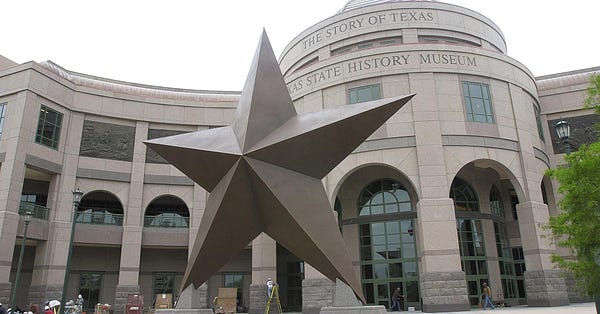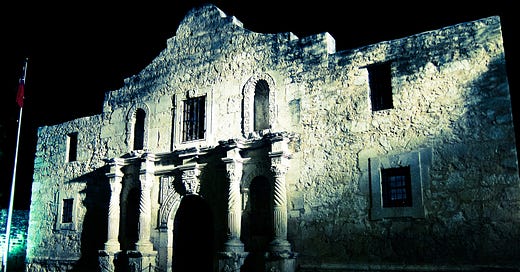America Will Defend Its Myths to the Death Before Admitting the Truth
Texas Republicans preferred to go down with the lies of the Alamo than abandon the myth of American exceptionalism.
The United States loves the stories it tells about itself. Take the American Revolution and "Independence Day," which this country celebrates every year, unabashedly, without fail. The colonies fought for freedom from British rule, and that is why we come together to eat barbecue and hot dogs, and launch fireworks every July 4. Of course, the people who love these stories about the U.S. almost as much as they love life itself would rather fight truth to the death than to even let it be considered as merely one narrative about the U.S.
These exact people lost their minds over the weekend after the Twitter account for National Public Radio shared a timely thread on the Declaration of Independence. NPR has an annual tradition of tweeting and reading the document, prefaced with a note stating, "It says 'that all men are created equal' — but women, enslaved people, Indigenous people and many others were not held as equal at the time," and that "a document with flaws and deeply ingrained hypocrisies."
The backlash is just the latest example of right-wing reactionaries attempting to suppress a historical worldview that doesn't align with the white supremacist talking points that they've long embraced about both the foundation of this country and the existence of institutional racism today.
Given the pushback, and the nonsensical trending Twitter campaign to "defund NPR," you might assume that NPR's thread was somehow introducing shocking new information about the Declaration of Independence. But the thread merely reiterated an indisputable fact about the racist, sexist framework in which the document was created. Not that such underexamined history about the American Revolution doesn't exist — the defense of slavery, again, played a major role in this war. But NPR's Twitter thread was mild, if even that.


The disproportionate conservative response is a perfect example of the GOP's growing grip on the histories and myths we tell about the U.S., and more importantly, the histories we are allowed to teach to the next generation. Of course they are working themselves into a panic over a few tweets from NPR — to concede that the Declaration of Independence is a flawed document is to concede that the U.S. is anything less than the most perfect country in the world. More generally, we're seeing right-wing provocateurs throw absolute fits over historical analysis that doesn't morally align with the narratives they've clung to for decades.
The "critical race theory" bans sweeping the country are another great example of this. States are introducing and passing laws that ban the teaching of systemic racism in schools. (Really, it would be more accurate to say that they're banning all the things that the right thinks goes into teaching about systemic racism — making white kids feel bad, disparaging the existence of the United States, promoting the overthrow of the government.)
Meanwhile, teachers are left wondering how they might use the facts of history to inform students of the ways that racism and structural inequality persists in the U.S., but in a way that doesn't get them in trouble. And the outrage over these lessons, swept under the weaponized banner of the legal theory "critical race theory," is based in fiction — schools and districts don't teach "CRT" (though they should), while the right uses "CRT" as a dogwhistle for any discussion related to racism that doesn't defend their access to power.
Not to be outdone, the Texas GOP has fixed its sights on one of the greatest American myths as of late, a way to exercise their newfound skills for weaving a moral panic over historical accuracy and defending the legacy of the U.S., no matter how absolutely false.
Last week, Gov. Greg Abbott and Lt. Gov. Dan Patrick shut down a book event in Austin, Texas, for the new book Forget the Alamo: The Rise and Fall of an American Myth. The book was written by three Texan journalists as a revisitation of the myths behind the Battle of the Alamo in 1836. The book event, which was to take place at the Bullock Texas State History Museum, was canceled after Patrick, a member (like Abbott) of the State Preservation Board that oversees the museum, intervened. Texas land commissioner George P. Bush (aka Jeb Bush's son), who oversees the remnants of the Alamo compound, told Fox News, "woke culture has arrived to the shores of Texas."


For further insight on what led Texas Republicans to declare this book off-limits, here's a few excerpts from the Fresh Air interview with Forget the Alamo co-author Bryan Burrough about the intent and revelations that he's covered along with authors Jason Stanford and Chris Tomlinson, emphasis mine:
The siege of the Alamo was memorably depicted in a Walt Disney series and in a 1960 movie starring John Wayne. But three writers, all Texans, say the common narrative of the Texas revolt overlooks the fact that it was waged in part to ensure slavery would be preserved.
"Slavery was the undeniable linchpin of all of this," author Bryan Burrough says. "It was the thing that the two sides had been arguing about and shooting about for going on 15 years. And yet it still surprises me that slavery went unexamined for so long."
What a familiar surprise — another piece of American history that has managed to avoid being associated with slavery, despite very much having everything to do with slavery. And now, the people in power who are trying to get rid of lessons on systemic racism in school are also trying to discount the role that slavery played in Texas. According to the book, it turns out Mexican Gen. Antonio López de Santa Anna came to the Alamo because Texians, as these undocumented Texas occupants were known at the time, refused to honor Mexico's abolitionist government. It's also important to note that the book also destroys the explicitly anti-Mexican white Anglo hero narrative that has long been told about the Alamo.
Burrough's interview continues, emphasis mine again:
It still surprises me that slavery went unexamined for so long. But then you have to understand: The Texas revolt, for 150 years, was largely ignored by academics, in part because it was considered déclassé, it was considered provincial, and because the state government of Texas, much as they're doing now, has for 120, 130 years, made very clear to the University of Texas faculty and to the faculty of other state-funded universities that it only wants one type of Texas history taught ... and that if you get outside those boundaries, you're going to hear about it from the Legislature.
The entire Fresh Air interview is worth a listen. In fact, every interview the authors have done has been helpful to shaping my understanding of the history they're introducing. There have also been excerpts published in Vanity Fair and Texas Monthly.
As someone who grew up in the Texas public education system, all of this is surprising I, like every other former student of the Texas public education system, took at least one year of Texas history, and I don't recall being taught that slavery was a factor in Texas independence, nor that Santa Anna was an abolitionist. But it is simultaneously not surprising at all. Texas education has always had limits on teaching the truth about its history. All of this shit makes you go, "Uhhh? What the fuck? Is anyone else seeing this??" because it's almost so perspective-shifting that you just want to make sure someone else is experiencing it too.
And then I'm left wondering what kind of big conspiracy could have hidden this history for so long, even despite historians attempting to challenge the traditional narratives of the Alamo in recent decades. It's not that hard to figure out — like any other American myth, the myth of the Alamo is the story recognized and enshrined by people in power because it serves a greater purpose than the truth. When we consider these implications about slavery and enslaving people in Texas, Texas goes from the oppressed that escaped tyrannical rule under Mexico, to the oppressor.
These so-called Texas "culture" "warriors" of the GOP are either playing three-dimensional chess by getting a book event for Forget the Alamo canceled, or they're the silliest pieces of shit to ever come into office who have no idea what they've just done. Before last week, I had no clue about this book, and I wonder if I would have found it as quickly after its publishing, or really, ever, at all, if it weren't for Abbott and Patrick trying to cancel book events because they were afraid that people would believe these authors and forget the Alamo.
This was, actually, a message from either Stanford or Burrough while on the Now More Than Ever podcast last month — when asked whether they thought Forget the Alamo would have the kind of cultural significance needed to bring about change to the narrative statewide, one of them said, no — they'd have to wait for the death threats and the book burnings to get anywhere close to that amount of attention. It feels as if getting their event canceled by the Texas government's leaders may have been the next best thing. And all because Abbott and Patrick preferred to go down with the lies of the Alamo if it meant defending patriotism over abandoning the myth of American exceptionalism.





